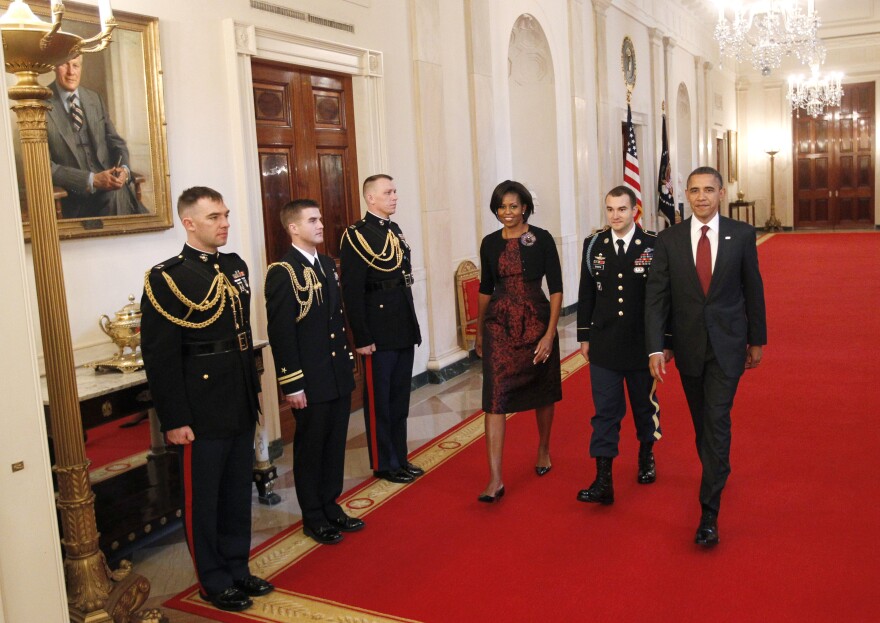In 2010, Army Staff Sgt. Salvatore (Sal) Giunta became the first living recipient of the nation's highest military honor since the Vietnam War.
Giunta received the Medal of Honor for actions he took during an insurgent ambush in 2007. He served with an airborne brigade combat team in a remote area of Eastern Afghanistan.
In October of 2007, according to Army reports, an insurgent force ambush split Giunta's squad into two groups. Giunta then exposed himself to enemy fire, to pull a comrade back to cover, while engaging the enemy and attempting to link up with the rest of his squad. At one point, Giunta noticed two insurgents carrying away a fellow soldier. He immediately engaged the enemy, killing one and wounding the other. He also provided medical aid to his wounded comrade while the rest of his squad caught up and provided security.
Giunta is from Hiawatha and graduated from Kennedy High School in Cedar Rapids in 2003.
In 2010, shortly before he was bestowed with the Medal of Honor at a White House ceremony with then President Barack Obama, he spoke with Ben Kieffer on River to River. As part of the Leaving Afghanistan series, we revisit that conversation.
On the moments that led to the honor
“You can train it all you want, you can fire blanks out of the weapons and you can pretend like, 'hey, fix this person, he's hurt.' But until you actually get in that situation, you'll never know.”
“As far as a thought process, there really wasn't one. We were just going through the motions that were already ingrained in us from, probably, basic training in the Army.”
On the bond that develops between soldiers
“No one's concerned about themselves in that situation. Everyone's concerned about the person to their left and the person to their right, the same. I am for them. They are for me.”
“Josh Brennan was walking point. He was the first man, but behind him was Frank Eckrode. Behind him was Erick Gallardo. Behind him was myself. I had my cell gunner, Kaleb Casey. I had my 203 gunner, Garrett Clary. These are all men that are in the same position that I'm in. I know there were more people there. I don't know how that went for them. But I know as far as those names I named, they went through exactly what I went through.”
“The hottest fires helped forge the hardest metals. And I think that bond we have in war creates our own brotherhood.”
“We talk about stuff, but we don't usually talk about this [the ambush]. We have a lot of good times we can remember.”
On media attention and receiving the Medal Of Honor
“That day, I didn't do anything, in my eyes, spectacular or amazing, because there were a lot of things that were going on, and there was a lot of danger, and no one person was in more danger or less danger than the other ones. And I was able to do what I did because all the guys that I was with were doing everything they could.”
“It is such a huge honor. And it's an opportunity to to let the American people know how hard its soldiers are fighting for them so they can live the life they live every single day uninterrupted, when there's a large group of people that their lives are incredibly interrupted and they're giving their blood, sweat and tears so we can go to the mall, and so we can hang out after school or whatever you do. And if this is what I can do is bring the attention to the people about all these other people I could do this every day.”
“I'm a pretty calm, relaxed guy from Iowa. And all this media attention is — it's a lot. It’s big. And it kind of came really overnight.”
“I think I did what everyone else was doing, I think because of the circumstances and because of — the piece that I did is what people are calling above and beyond, but I don't think there's anyone in Afghanistan or Iraq right now that you can't say is going above and beyond the call of duty.”
According to NBC News, Giunta chose not to re-enlist and left the military in 2011. His book “Living with Honor: A Memoir,” was published in 2012.
If you served in Afghanistan and would like to share your story on IPR, please email: rivertoriver@iowapublicradio.org by Sept. 3. You can find more information about the Leaving Afghanistan series here.











